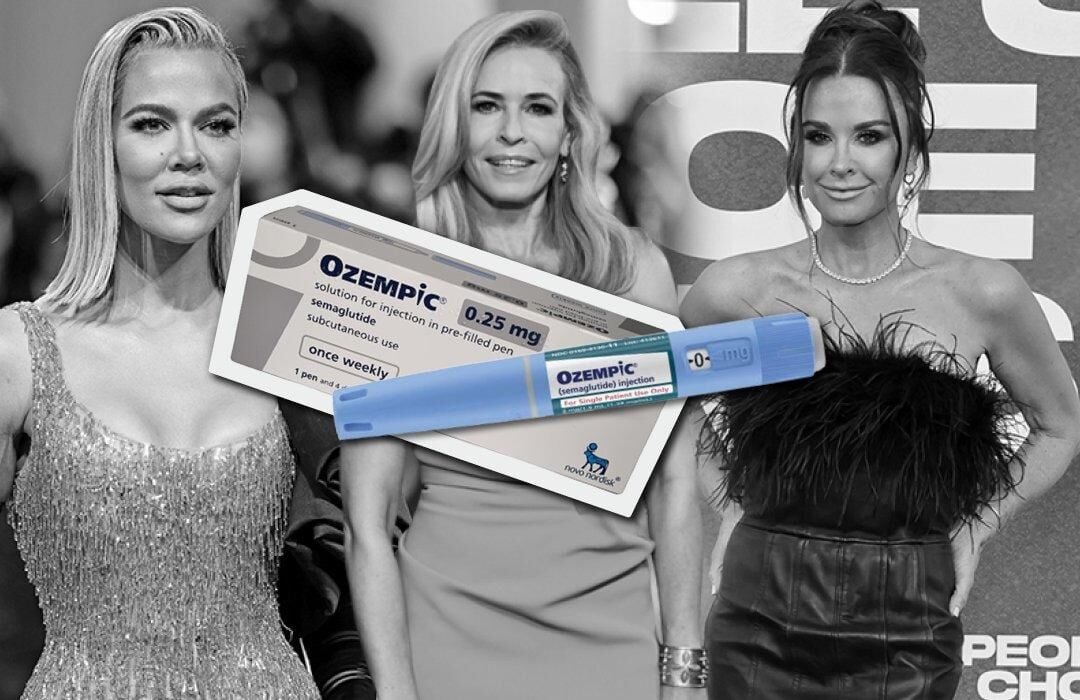Ozempic, The Miracle Weight Loss Drug That Has Triggered Worldwide Debate, From Hollywood’s “Ozempic Epidemic” To Warnings “It Could Be The Next Opioid Crises” To “Fat Phobia”; How Ozempic Could Affect The Health Of The Global Economy In More Ways Than One!

Remember how the introduction of Viagra took the world by storm; the significant “accident” in the world of medicine has found a contender!
Ozempic which was initially developed to treat type 2 diabetes, has unexpectedly become one of the most sought-after products in the developed world.
While Viagra was originally created to treat hypertension and angina and unexpectedly provided joy to millions, Ozempic, on the other hand, has the potential to transform the health and food industries, boost the global economy, and even reshape the future.
Had Ozempic merely performed its intended function, the excitement surrounding it—known as GLP-1 agonists in medical circles—would have remained within medical journals.
Although it is a breakthrough in treating type 2 diabetes, Ozempic also mysteriously enables significant weight loss, even for those who have struggled with weight since birth- thus leading to its insatiable demand (how ironic, indeed).
Not only this, Ozempic’s popularity has catapulted its manufacturer, Novo Nordisk, to the top of European business, it is now the European Union’s largest corporation, worth over half a trillion US dollars, and has driven nearly all of Denmark’s recent economic growth.
 Hollywood’s Ozempic Epidemic
Hollywood’s Ozempic Epidemic
Hollwood has taken to Ozempic and how, it has become synonymous with celebrity weight loss.
In recent years, celebrities and influencers have glorified the drug as a miraculous weight-loss solution, with the hashtag #ozempic garnering over a billion views on TikTok.
Many stars have also shared their Ozempic experiences, increasing public interest in the drug’ however, this swell in demand has impacted access for those who need it for medical reasons.
Elon Musk, Whoopi Goldberg, Sharon Osbourne, Amy Schumer, and Tracy Morgan are among the well-known figures who have discussed their experiences with Ozempic, both positive and negative.
While, Oprah Winfrey attributed her recent weight loss to an unnamed prescribed drug (secret).
The drug’s all-presence was underlined when comedian Chelsea Handler revealed in an interview that she didn’t even realize she was taking it during the brief period she used it.
Initially, the drug—costing over $1,000 per month without health insurance—has become a status symbol in Hollywood.
Celebrities, known for their impatience with long waits, whether for champagne or diets, found Ozempic’s exclusivity added to its appeal— access to it meant you were in the know.
 The Pointed Advertising
The Pointed Advertising
Targeting the wealthy and famous who have used diabetes medication for weight loss, Eli Lilly—manufacturer of Mounjaro and the weight loss drug Zepbound—aired a pointed television ad days before this year’s Academy Awards.
The ad featured scenes of Hollywood glamour: red carpets, photographers, and a woman preparing a glittering gown.
“Some people have been using medicine never meant for them for the smaller dress or tux, for a big night, for vanity,” the narrator said. “But that’s not the point.”
The visuals then shifted to a casually dressed woman on public transportation as the narrator continued, “People whose health is affected by obesity are the reason we work on these medications. It matters who gets them.”
Following the success, Eli Lilly CEO David Ricks announced in January that Zepbound had reached 25,000 new prescriptions per week by the end of December 2023.
At the same time, he expressed concerns that the company’s 2024 supply might not meet the rising demand!
According to the Centers for Disease Control and Prevention, about 40 percent of American adults and 20 percent of U.S. children are obese, with over 38 million people in the U.S. having diabetes.
This represents a substantial market for diabetes medication, without the additional pressure of serving the growing weight loss market.
 So, what is this wonder drug and the others raking in the money?
So, what is this wonder drug and the others raking in the money?
Ozempic is an injectable prescription drug used to manage blood sugar levels in patients with type 2 diabetes. It is based on a naturally occurring human hormone called glucagon-like peptide 1 (GLP-1), which plays a crucial role in regulating appetite and blood sugar levels.
The active ingredient in Ozempic is semaglutide, a GLP-1 agonist. This means it mimics GLP-1 and activates its receptors. Studies have shown that people with obesity are often less sensitive to the hormones that signal fullness. By slowing gastric emptying, drugs like Ozempic can restore feelings of fullness in these patients.
It Could Be The Next Opioid Crisis
Writer Johann Hari, upon learning about the drug’s potential and using it himself, found himself deeply conflicted.
Was this a magic pill or something more sinister? What would happen if the drug got into the wrong hands?
These questions led Hari to write his new book, Magic Pill: The Extraordinary Benefits and Disturbing Risks of the New Weight Loss Drugs.
His research took him from Iceland to Minneapolis and Tokyo, where he interviewed over 100 leading experts on the drug; in his book, he shares some of his most shocking findings and discusses how the drug could change the future of health—for better and for worse.
What concerned him most about the rise of Ozempic and similar drugs.
When discussing the safety of these drugs, many scientists argue—reasonably—that they have substantial evidence about these drugs, as diabetics have been taking them for 18 years. They assert that if these drugs had severe side effects, such as growing horns, diabetics would have shown these effects by now. This point provides some reassurance.
However, other scientists have investigated further.
In the book, Hari interviews Professor Jean-Luc Faillie, a pharmacology specialist at Montpellier University in France, who the French Medicines Agency commissioned to investigate the safety of these drugs.
He was particularly disturbed by evidence showing that rats given these drugs are significantly more likely to develop thyroid cancer.
He then analyzed data from diabetics who took these drugs between 2006 and 2018 and compared it to a group of diabetics who had not taken them. His findings are chilling.
He calculated that these drugs increase thyroid cancer risk by 50% to 75%.
However, this doesn’t mean that taking these drugs gives you a 50% to 75% chance of getting thyroid cancer, but rather that whatever your initial risk was, it will increase by 50% to 75%.
Hari states that the professor’s findings are contested, but even if he’s correct, one must compare this risk to the cancer risks posed by obesity. Obesity is one of the biggest cancer causes in Britain.
 However, on a personal level, as someone taking these drugs, he said he is worried about the long-term effects – “It’s strange because I’ve learned so much about the benefits of Ozempic and its 12 major risks, yet I’m still conflicted. It’s a genuinely complicated issue.”
However, on a personal level, as someone taking these drugs, he said he is worried about the long-term effects – “It’s strange because I’ve learned so much about the benefits of Ozempic and its 12 major risks, yet I’m still conflicted. It’s a genuinely complicated issue.”
When asked about what was the most surprising thing he learned from all of the research, he states –
“The most surprising thing I discovered was the stark reality of obesity. While the risks associated with these drugs are significant—such as increased thyroid cancer risk, dangers for pregnant women, and potential depression—it’s the risks of obesity that are even more alarming. For example, if you’re obese at 18, your likelihood of developing diabetes in your lifetime is 70%. Diabetes can reduce your life expectancy by 15 years and is the leading preventable cause of blindness in Britain.”
One effective way to understand Ozempic’s benefits for treating obesity is to compare it to bariatric surgery, the most reliable method for rapid and sustained weight loss until now.
Despite its grueling nature and a 1 in 1,000 mortality rate during surgery, the benefits are substantial. Post-surgery, patients are 56% less likely to die from heart attacks, 60% less likely to die from cancer, 92% less likely to die from diabetes-related causes, and 40% less likely to die from any cause over the following seven years.
Similar benefits are emerging with these drugs due to their dramatic weight-loss effects. Within a couple of years, users are 20% less likely to have a heart attack or stroke.
Anyone who is obese or overweight must weigh the risks of these drugs against the risks of obesity, both of which are significant. There’s no simple answer, and anyone claiming otherwise is oversimplifying a complex issue.
 What are the concerns about the drug falling into the wrong hands?
What are the concerns about the drug falling into the wrong hands?
Before the pandemic, Britain had the highest rate of eating disorders in its history, and these rates increased during the pandemic. These drugs provide an unprecedented means to suppress appetite, raising concerns about a potential crisis similar to the opioid epidemic, particularly affecting young girls and boys who might starve themselves.
Thus, what needs to be done to safeguard the drug?
We need to tighten prescription regulations significantly. According to Dr. Kimberly Dennis, a leading eating disorders expert in the US, patients should be required to attend in-person appointments to obtain these drugs, where doctors check their BMI and are trained to identify eating disorders.
There are those who use these drugs to reach a healthy weight, but there are also individuals who are already at a healthy weight or are underweight, using them to become extremely skinny. The risk calculus is very different for these groups.
What will happen when these drugs become more widely available for weight loss and not just for the rich and famous?
Access will certainly expand, and the NHS will likely start prescribing it to severely overweight individuals. Eight years from now, when Ozempic’s patent expires, it will likely cost about a pound a day and be available in pill form.
A leading heart disease specialist in Britain predicts that at that point, 30% of British people could be taking it, which would have enormous consequences.
Barclays Bank enlisted financial analyst Emily Field to assess these drugs for their future investment strategies. Her conclusion echoed a seismic impact akin to the invention of the smartphone—such is the potential explosiveness of these developments.
While the benefits of drugs like Ozempic are notable, there remains a concern that their harms may outweigh these advantages. It’s likely that we’re already witnessing a range of unpredictable effects, some beneficial and others detrimental. Over the next few years, we’ll gain a clearer understanding of their overall impact.
 As Ozempic and similar drugs become more prevalent, how can we ensure people aren’t stigmatized because of their weight?
As Ozempic and similar drugs become more prevalent, how can we ensure people aren’t stigmatized because of their weight?
Stigma, in any form, is inherently cruel. Shockingly, 42% of women with a BMI over 35 experience daily harassment. It’s imperative that we collectively oppose such discrimination.
Moreover, we should aim to reduce obesity where feasible, as it significantly impacts health. As body positivity advocate Shelley Bovey wisely noted, this isn’t an either-or scenario—it’s about protecting individuals from both bullying and the serious health risks associated with obesity, such as diabetes, heart disease, and cancer.
What Hari outlines is significant!
Back home, fashion designer Masaba Gupta spotlighted concerns about the rapid rise of quick weight loss methods, including diabetes drugs. She emphasized the importance of sustainable approaches to health, urging people to prioritize physical activity over shortcuts.
Echoing this sentiment, Dr. Gaurav Jain, Senior Consultant in Internal Medicine at Dharamshila Narayana Superspeciality Hospital, cautioned against rapid weight loss due to its potential physical and mental health risks. These include nutrient deficiencies, dehydration, muscle loss, gallstones, mood changes, hormonal imbalances, and other serious complications.
Dr. Pranav Honnavara Srinivasan, Consultant in Gastrointestinal Surgery and Bariatric Surgery at Sparsh Hospital, further emphasized that restrictive weight loss plans place immense stress on the body, slowing metabolism and causing muscle loss instead of fat. This can lead to long-term issues like osteoporosis, lowered immunity, and other health complications.
These perspectives emphasise the importance of balanced and sustainable approaches to weight management, focusing on overall health and well-being rather than quick fixes that may pose significant risks in the long term.
 Influencing Young Consumers
Influencing Young Consumers
Over the years, celebrities have endorsed various health and fitness trends, from Pilates to the acai berry, captivating a young audience who emulate their lifestyles seen on TV and online.
The rising popularity of weight loss drugs inevitably positions them as a standard method for slimming down among younger audiences.
Psychiatrist Lieberman expressed concerns to Newsweek, stating that this trend “sends a troubling message to body-conscious children and teens. Instead of promoting healthy eating habits, some may develop eating disorders or pressure their parents to obtain Ozempic.”
Echoing these concerns, Levine emphasized that “young people see celebrities and influencers endorsing Ozempic as a quick and easy solution for weight loss, perceiving it as a healthy choice. However, they may overlook the broader aspects of health, including exercise, balanced diet, and mental well-being.”
“Understanding that weight management involves more than a rapid fix is crucial for future generations,” Levine added.




